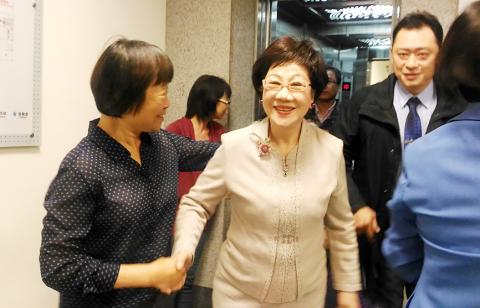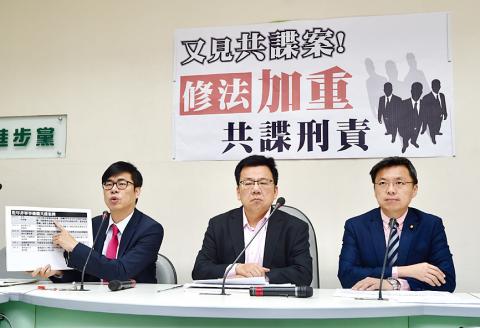A former National Security Bureau agent responsible for protecting former vice president Annette Lu (呂秀蓮) was detained on suspicion of espionage, prompting lawmakers to call for increased penalties for people caught spying for China.
Major Wang Hung-ju (王鴻儒), a former agent of the Special Service Command Center, was arrested on Monday for allegedly attempting to develop a spy network for China.
Wang allegedly attempted to recruit a Military Police Command intelligence officer surnamed Tseng (曾) to gather information about operations in exchange for a large cash payment and safe relocation to China if Tseng was exposed. Tseng rejected the offer.

Photo: Tsai Wen-chu, Taipei Times
Wang’s activity was discovered by the Ministry of Justice Investigation Bureau during a probe into Taiwanese businessman Ho Chih-chiang (何志強), who in 2010 was sentenced to 14 months in prison for attempting to recruit a security bureau official to collect information about overseas national security officials; the security bureau’s satellite communication system; Taiwan’s Japan policy and “secret diplomacy”; the Tibetan independence movement; and Falun Gong activities.
Wang, a former military police officer, was transferred to the security bureau’s special service unit in 2002 to protect Lu.
He retired in 2003 and was allegedly recruited by Chinese intelligence operatives in 2009.

Photo: Chien Jung-fong, Taipei Times
Ministry of National Defense spokesman Major General Chen Chung-chi (陳中吉) yesterday said that no active military personnel are involved in Wang’s espionage ring.
The ministry has counterintelligence measures in place and warns active and soon-to-be-retired soldiers and officers against spying for China, he said.
The Democratic Progressive Party (DPP) legislative caucus called for increased penalties for people caught spying for China, as offenders are handed moderate prison terms.
Among those convicted of Chinese espionage in recent years, former navy lieutenants Chien Ching-kuo (錢經國) and Lu Chun-chun (盧俊均) were sentenced to 10 months in prison in 2014, while last year former Chinese People’s Liberation Army officer Zheng Xiaojiang (鎮小江) and retired Republic of China Army major general Hsu Nai-chuan (許乃權) were sentenced to a four-year and a two-year-and-10-month prison term respectively.
“Those were cases that caused a national uproar, but only lenient punishments were given,” DPP Legislator Chen Chi-mai (陳其邁) said.
The Criminal Code stipulates a prison sentence of three to 10 years for people disclosing national secrets to a foreign state, but China is not seen as a foreign state due to the complicated cross-strait political relationship, DPP Legislator Chao Tien-lin (趙天麟) said.
Spying for China is punishable according to the National Security Act (國家安全法), which stipulates a prison sentence of one to seven years.
“Chinese spies and Taiwanese spying for China have exploited the legal inconsistency to avoid heavier criminal sentences,” Chao said.
Chao proposed amending the National Security Act to increase the prison sentence for espionage to three to 10 years.
A preliminary review of the proposal was completed in the previous legislative session.
Chao and Chen Chi-mai called on the legislature to finalize the review this session to ensure that Chinese spies would be duly punished.

The combined effect of the monsoon, the outer rim of Typhoon Fengshen and a low-pressure system is expected to bring significant rainfall this week to various parts of the nation, the Central Weather Administration (CWA) said. The heaviest rain is expected to occur today and tomorrow, with torrential rain expected in Keelung’s north coast, Yilan and the mountainous regions of Taipei and New Taipei City, the CWA said. Rivers could rise rapidly, and residents should stay away from riverbanks and avoid going to the mountains or engaging in water activities, it said. Scattered showers are expected today in central and

COOPERATION: Taiwan is aligning closely with US strategic objectives on various matters, including China’s rare earths restrictions, the Ministry of Foreign Affairs said Taiwan could deal with China’s tightened export controls on rare earth metals by turning to “urban mining,” a researcher said yesterday. Rare earth metals, which are used in semiconductors and other electronic components, could be recovered from industrial or electronic waste to reduce reliance on imports, National Cheng Kung University Department of Resources Engineering professor Lee Cheng-han (李政翰) said. Despite their name, rare earth elements are not actually rare — their abundance in the Earth’s crust is relatively high, but they are dispersed, making extraction and refining energy-intensive and environmentally damaging, he said, adding that many countries have opted to

FORCED LABOR: A US court listed three Taiwanese and nine firms based in Taiwan in its indictment, with eight of the companies registered at the same address Nine companies registered in Taiwan, as well as three Taiwanese, on Tuesday were named by the US Department of the Treasury’s Office of Foreign Assets Control (OFAC) as Specially Designated Nationals (SDNs) as a result of a US federal court indictment. The indictment unsealed at the federal court in Brooklyn, New York, said that Chen Zhi (陳志), a dual Cambodian-British national, is being indicted for fraud conspiracy, money laundering and overseeing Prince Holding Group’s forced-labor scam camps in Cambodia. At its peak, the company allegedly made US$30 million per day, court documents showed. The US government has seized Chen’s noncustodial wallet, which contains

SUPPLY CHAIN: Taiwan’s advantages in the drone industry include rapid production capacity that is independent of Chinese-made parts, the economic ministry said The Executive Yuan yesterday approved plans to invest NT$44.2 billion (US$1.44 billion) into domestic production of uncrewed aerial vehicles over the next six years, bringing Taiwan’s output value to more than NT$40 billion by 2030 and making the nation Asia’s democratic hub for the drone supply chain. The proposed budget has NT$33.8 billion in new allocations and NT$10.43 billion in existing funds, the Ministry of Economic Affairs said. Under the new development program, the public sector would purchase nearly 100,000 drones, of which 50,898 would be for civil and government use, while 48,750 would be for national defense, it said. The Ministry of